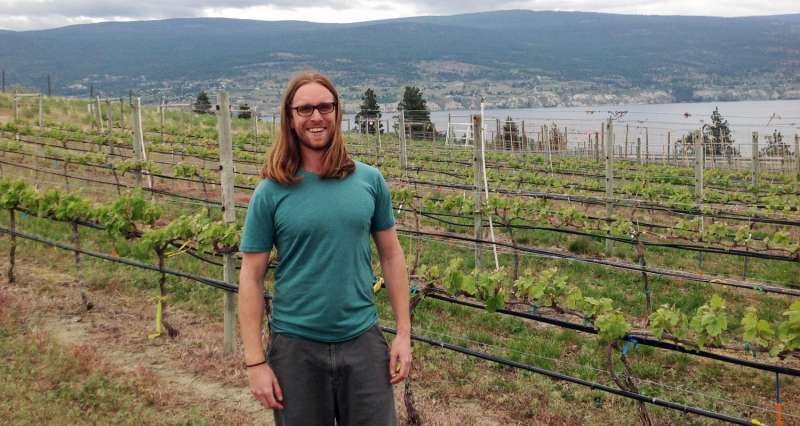Researchers determine vineyards adversely affect soil quality

UBC biologists are digging under vineyards to see if the Okanagan's grape industry is affecting soil quality.
Miranda Hart, an associate professor of biology at UBC's Okanagan campus, her PhD candidate Taylor Holland, along with Agriculture Canada research scientist Pat Bowen, has spent the better part of three years studying soil samples from more than 15 vineyards throughout the Okanagan.
Specifically, they were looking at soils in vineyards and neighbouring natural—or uncultivated—habitats. With samples from both areas, the scientists compared the bacterial and fungal communities between these habitats, hoping to determine what's happening to the soil under the wine-producing grapes.
They determined there was a definite difference in soil communities between the natural valley soil and the vineyard soil.
"Soil biodiversity may be an important part of terroir, which is everything to a grape grower, so they have a vested interest in ensuring we preserve soil biodiversity," says Hart "This baseline study shows us that BC wine growing regions are different in terms of the organisms that live in the soil."
All agricultural activity will affect the soil, some more than others, Hart explains. But in order to know how the soil is being changed, researchers wanted to compare samples with natural, uncultivated areas alongside processed areas.
"We have to take care of the microbes in the soil," she says. "The biodiversity of soil microbes is essential if we are to feed our growing population."
While Hart points out there is a limited understanding of how agriculture practices change soil biodiversity, it is important to understand what the soil would be like if left in its natural state, so growers are aware of how they may be changing it.
The samples they tested showed that bacterial and fungal communities responded differently to viticulture: bacteria had a higher biodiversity in vineyards, compared to fungi which had higher biodiversity in unmanaged areas.
These results indicate that viticulture practices influence key environmental factors that control soil microbial communities and possibly affect nutrient availability and other services provided by natural soil communities, says Holland. Microbes are big part of the soil for grape growers; what happens underground can influence the vine growth and fruit development and downstream wine assets, he explains.
"Improved knowledge of how management choices affect microbial communities and their influences on crop performance would benefit the design of efficient and sustainable production systems," Holland adds. "As we move towards more natural practices, hopefully we can reduce these differences."
Bowen, who works at the Summerland research centre, says knowing what's happening in the soil is a vital part of agriculture for several reasons.
"Microbial communities also play an important role in stabilizing vineyard ecosystems which can reduce the need for pesticides and other resource inputs," Bowen adds.
Hart's research, funded by an NSERC Discovery Grant, and other funds provided by the BC Wine Grape Council and Agriculture & Agri-Food Canada, was recently published in Applied Soil Ecology.
Journal information: Applied Soil Ecology
Provided by University of British Columbia



















